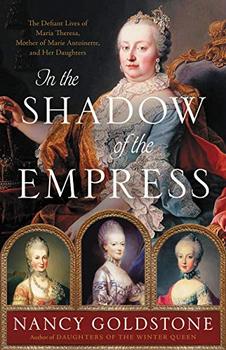Summary | Excerpt | Reading Guide | Reviews | Beyond the book | Read-Alikes | Genres & Themes | Author Bio

The Defiant Lives of Maria Theresa, Mother of Marie Antoinette, and Her Daughters
by Nancy GoldstoneThe Holy Roman Empire and its Habsburg rulers often seem like relics consigned to dusty books and long-ago high school history classes. Nancy Goldstone brilliantly brings to life the court and the characters of the Empire in the 18th century, melting away the expanse of time between us and these monarchs who changed history. Family dynamics, career frustrations, the pain of losing loved ones — all come across in vivid detail to make the distant past seem not just closer, but eminently relatable as well.
In the Shadow of the Empress: The Defiant Lives of Maria Theresa, Mother of Marie Antoinette, and Her Daughters, is exactly what its title says it is: a braided tale of Maria Theresa and the lives of three of her daughters — as a mother of 16 children she had many others, but the three chosen here were the most important, both politically and dynastically.
The book begins with Maria Theresa herself, who became Holy Roman Empress at age 23 due to a lack of Habsburg male heirs in the early 18th century. The Habsburgs had ruled most of central Europe, particularly Germany, Austria, Hungary and the Slavic areas of Eastern Europe, since the late 13th century. After some periods out of power in their early years, they were firmly ensconced by the 15th century and would go on to rule as kings and emperors until the First World War. While wives of emperors had been crowned "empress" before her, Maria Theresa was the first (and last) woman to actually rule the empire in practice, not just in title. The Holy Roman Empire itself was a collection of lands in what is now known as Germany and into central Europe that lasted from the late Middle Ages until the Napoleonic Wars. Maria Theresa inherited these huge swaths of central Europe from her father, Emperor Charles VI, in 1740, and ruled as Queen of Hungary and Bohemia and Empress of the Holy Roman Empire for 40 years, until her death at age 63.
As one of a very small number of female monarchs in European history, Maria Theresa was a fascinating figure — constantly defending her authority from courtiers who sought to usurp it and stopping the frequent incursions on her territories from male monarchs who thought she was weak. Under these incredible circumstances, she managed to fend off the formidable King of Prussia Frederick the Great militarily, reaching stalemates with his powerful army multiple times. On top of that, she made meaningful reforms to the empire's finances and educational policies (see Beyond the Book), held together a huge multi-ethnic empire, and give birth to a brood of children.
Goldstone, an accomplished popular historian of pre-modern queens, depicts the emotions and tense moments of Maria Theresa's life in accessible prose and delightful details, making the reader feel close to the action and presenting the empress as a relatable, real person. The author is right, however, not to turn this into a hagiography: Maria Theresa was extremely anti-Semitic and in general staunchly intolerant of religious pluralism by modern standards. Goldstone doesn't belabor the point, but she does present a balanced view of a pre-modern person through a 21st-century perspective.
As Maria Theresa aged and began ruling with her son Joseph as co-regent, the story moves to the intertwined lives of her daughters Maria Christina, Maria Carolina (known as Charlotte) and Marie Antoinette. The narratives overlap, running through the tumultuous 18th century as the political map of Europe — and the world — was reshaped. Maria Christina, her mother's favorite child, led a dignified life with multiple important positions politically in the Holy Roman Empire. Maria Carolina became Queen of Naples due to the untimely death of an older sister who was betrothed to that throne. The constant jockeying of marriage alliances during this period was dizzying, but Goldstone thoroughly and clearly catalogs the ever-moving chess pieces.
Marie Antoinette, of course, was the doomed Queen of France, and Goldstone spends significant time on her full biography. From a carefree little girl — 15th in her family and often an afterthought — to the glittering, glamorous queen, Marie Antoinette led a truly extraordinary life, but she wasn't the cruel caricature she was later depicted to be.
Goldstone describes her husband Louis XVI's difficulties with human interaction, which made ruling his courtiers and subjects extremely difficult (it is now believed he had autism). Marie Antoinette struggled with the rigors of court life and her husband's emotional and physical distance, which meant that for years they had no children, the all-important heirs that were her greatest obligation in life.
While this close examination of Marie Antoinette humanizes her and is a valuable three-dimensional description of a complex person, Goldstone blithely overlooks the conditions that led to her downfall. She mentions the famines, wars and widespread poverty of the French population only in passing — depicting them as minor irritations to a beleaguered monarchy rather than as the very real suffering of millions of people. Louis and Marie Antoinette's grisly end was cruel and arguably unfair, but at no point did either of them attempt to change any of the conditions that made them so hated: no reductions to their lavish spending, no fewer palaces built, no assistance to their own people. By overlooking this inability or unwillingness to reform, Goldstone's portrayal of Marie Antoinette is unfortunately incomplete.
That being said, the author's rich detail and ability to make these historical figures understandable as human beings to a modern audience is a testament to her skill as a historian and storyteller. In the Shadow of the Empress shines a well-deserved light on Maria Theresa, one of the most extraordinary female rulers in European history, and shows that common misconceptions and the fog of time don't have to obscure the lives of mesmerizing figures.
![]() This review was originally published in The BookBrowse Review in November 2021, and has been updated for the
October 2022 edition.
Click here to go to this issue.
This review was originally published in The BookBrowse Review in November 2021, and has been updated for the
October 2022 edition.
Click here to go to this issue.

If you liked In the Shadow of the Empress, try these:

by Anne Higonnet
Published 2024
Three women led a fashion revolution and turned themselves into international style celebrities.

by Diana Giovinazzo
Published 2022
As Marie Antoinette took her last breath as Queen of France in Paris, another formidable monarch - Antoinette's dearly beloved sister, Charlotte - was hundreds of miles away, in Naples, fighting desperately to secure her release from the revolutionaries who would take her life. Little did Charlotte know, however, that her sister's execution would ...
Your guide toexceptional books
BookBrowse seeks out and recommends the best in contemporary fiction and nonfiction—books that not only engage and entertain but also deepen our understanding of ourselves and the world around us.